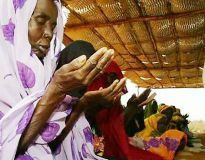Delayed Sudan’s Darfur peace talks to kick off in Abuja Monday
By Silvia Aloisi
ABUJA, Oct 24 (Reuters) – Sudan’s government and two rebel groups fighting in Darfur start a fresh round of peace talks on Monday to try to end a conflict that has sparked international outcry and triggered one of the world’s humanitarian crises.
 The talks, initially meant to start last Thursday, were delayed because of a transport mix-up, which meant that many rebel delegates only arrived in Abuja at the weekend.
The talks, initially meant to start last Thursday, were delayed because of a transport mix-up, which meant that many rebel delegates only arrived in Abuja at the weekend.
Previous peace negotiations in Nigeria’s capital dragged on for three weeks only to collapse with no agreement, but international mediators say they hope this time will be different.
“My impression is that this time people are more willing to discuss,” said Jan Pronk, the U.N. secretary-general’s special representative in Sudan.
The two rebel groups launched a revolt in western Sudan in early 2003 after years of skirmishes between mainly African farmers and Arab nomads over land. They accuse the government of arming Arab militias, known as Janjaweed, to crush them and their civilian sympathizers, a charge Khartoum denies.
The conflict has driven 1.5 million people from their homes and the United Nations estimates 70,000 people have died from malnutrition and disease in the last seven months alone.
The United States has called the campaign of killing, raping and looting unleashed by the Janjaweed militias genocide, and a U.N. resolution has threatened to impose sanctions on Khartoum if it does not stop the violence and disarm the militias.
Both the rebels and the government say they are committed to the talks, which are sponsored by the African Union (AU), but mistrust between the two sides runs as deep as ever.
“We are interested in finding a just and sustainable peace. We are here for that purpose,” said Sharif Harir, the chief negotiator for the main rebel movement, the Sudan Liberation Army (SLA).
SEARCH FOR SOLUTION
“But we have to look at what they (the government) have to offer. My personal impression is that they are not serious,” he said.
Sudanese State Minister for Foreign Affairs Najeeb Al-Kheir Abdul Wahab said his government was open to “whatever can bring a solution” but said the rebels also have to agree to put their fighters in cantonment sites and lay down their weapons.
“For disarmament to work, it has to involve the other parties as well and not only the government,” he told Reuters.
The AU has agreed to increase its force in Darfur to 3,320, but the troops’ mandate is to monitor — not enforce — a shaky cease-fire in a region the size of France.
The European Union is considering funding the AU mission in Darfur, offering more than $100 million with more provided by member states.
Some observers of the Abuja talks say both sides have an interest in dragging out the peace process.
They say the Darfur rebels are keen to see even more international pressure piled on Khartoum and may want to wait and see what concessions southern rebels would gain from the government in an expected deal to end a separate, two-decade-old conflict in the south of Africa’s largest country.
The government, heavily criticized over the crisis, aims to limit international condemnation by showing its willingness to negotiate in the hope that the world’s attention will fade away.
“IT’S GETTING WORSE”
“We are trying to instill a sense of urgency here because the situation in Darfur is not getting better, it’s getting worse and that should be a concern for all of us,” said Sten Rylander, an envoy from the Swedish foreign affairs ministry who is part of the mediation team.
AU and United Nations officials in Abuja said two new rebel factions have emerged in Darfur, threatening to further complicate international peace efforts there.
EU foreign policy chief Javier Solana in Khartoum on Sunday expressed concern about fresh violence.
“We are concerned by breaches of the cease-fire which are taking place by everybody,” EU foreign policy chief Javier Solana said during a two-day visit to the Sudanese capital.
“We are concerned about movement of helicopters also that belong to the government … If the cease-fire is broken it would be very difficult to fix it,” he added.
Sources in the aid community in Darfur reported heavy bombardment in North Darfur state last week as clashes between government and rebels intensified across all three Darfur states. AU monitors are investigating the reports.
